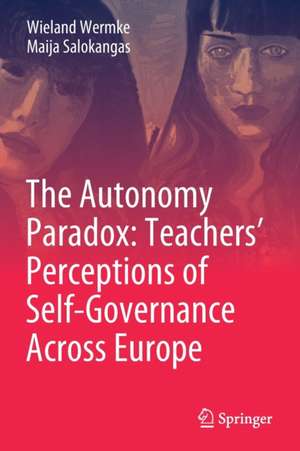The Autonomy Paradox: Teachers’ Perceptions of Self-Governance Across Europe
Autor Wieland Wermke, Maija Salokangasen Limba Engleză Paperback – 29 mar 2022
To answer these complex questions the authors asked thousands of teachers in four national contexts: in Finland, Ireland, Germany and Sweden, what they think autonomy looks like. The resulting book examines teacher autonomy theoretically and empirically, comparing teachers’ perceptions of their professional autonomy. Utilizing a mixed method approach the authors combine data from a large-scale questionnaire study, teacher interviews, lesson and meeting observations, and workshops that brought together teachers from the four participating countries. All this engagement with teachers revealed that simply increasing their professional autonomy might not lead to desired outcomes. This is because, from a teachers’ point of view, increased decision-making capacity brings further complexity and risk to their work, and it may instead lead to anxiety, self-restriction, and the eventual rejection of autonomy. These surprising conclusions challenge the increasingly orthodox view that increased autonomy is a desirable end in itself. This is what the authors call the autonomy paradox.
| Toate formatele și edițiile | Preț | Express |
|---|---|---|
| Paperback (1) | 522.42 lei 6-8 săpt. | |
| Springer International Publishing – 29 mar 2022 | 522.42 lei 6-8 săpt. | |
| Hardback (1) | 641.53 lei 6-8 săpt. | |
| Springer International Publishing – 25 mar 2021 | 641.53 lei 6-8 săpt. |
Preț: 522.42 lei
Preț vechi: 614.61 lei
-15% Nou
Puncte Express: 784
Preț estimativ în valută:
99.98€ • 103.99$ • 82.54£
99.98€ • 103.99$ • 82.54£
Carte tipărită la comandă
Livrare economică 15-29 aprilie
Preluare comenzi: 021 569.72.76
Specificații
ISBN-13: 9783030656041
ISBN-10: 3030656047
Pagini: 178
Ilustrații: XIII, 178 p. 22 illus., 14 illus. in color.
Dimensiuni: 155 x 235 mm
Greutate: 0.28 kg
Ediția:1st ed. 2021
Editura: Springer International Publishing
Colecția Springer
Locul publicării:Cham, Switzerland
ISBN-10: 3030656047
Pagini: 178
Ilustrații: XIII, 178 p. 22 illus., 14 illus. in color.
Dimensiuni: 155 x 235 mm
Greutate: 0.28 kg
Ediția:1st ed. 2021
Editura: Springer International Publishing
Colecția Springer
Locul publicării:Cham, Switzerland
Cuprins
Chapter 1. Magic Potion.- Chapter 2. Unpacking Teacher Autonomy Theoretically.- Chapter 3. Context Matters.- Chapter 4. Investigating Autonomy Empirically.- Chapter 5. Teacher Autonomy Compared.- Chapter 6. Theorizing Teacher Autonomy from a Comparative Perspective.
Notă biografică
Wieland Wermke is Associate Professor of education and works currently at Stockholm University, Department of Special Education, Sweden. Wieland’s research has its interest in comparative education with a special focus on teacher professionalism. Together with various colleagues, he has mostly investigated teachers in Germany, Sweden, Finland, Norway and England. Together with Maija Salokangas, he has conducted a comparative study on teachers’ perceived autonomy in four European countries, which is the foundation for this book. Wieland has also written a handbook (in Swedish) and articles on comparative education methodology.
Maija Salokangas is Associate Professor in the Department of Education, Maynooth University, Ireland. Her research explores the interplay between education policy and practice, with a focus on agency and autonomy. Recently, she has explored teachers’ work in a number of countries including Ireland, Finland, Sweden, Germanyand England. Maija’s earlier publications, including her previous book Inside the Autonomous School: Making Sense of the Global Educational Trend (2017) critique the international school autonomy movement.
Maija Salokangas is Associate Professor in the Department of Education, Maynooth University, Ireland. Her research explores the interplay between education policy and practice, with a focus on agency and autonomy. Recently, she has explored teachers’ work in a number of countries including Ireland, Finland, Sweden, Germanyand England. Maija’s earlier publications, including her previous book Inside the Autonomous School: Making Sense of the Global Educational Trend (2017) critique the international school autonomy movement.
Textul de pe ultima copertă
What do we mean when we speak about teacher autonomy? How free are teachers to go about their work?
To answer these complex questions the authors asked thousands of teachers in four national contexts: in Finland, Ireland, Germany and Sweden, what they think autonomy looks like. The resulting book examines teacher autonomy theoretically and empirically, comparing teachers’ perceptions of their professional autonomy. Utilizing a mixed method approach the authors combine data from a large-scale questionnaire study, teacher interviews, lesson and meeting observations, and workshops that brought together teachers from the four participating countries. All this engagement with teachers revealed that simply increasing their professional autonomy might not lead to desired outcomes. This is because, from a teachers’ point of view, increased decision-making capacity brings further complexity and risk to their work, and it may instead lead to anxiety, self-restriction, and the eventual rejection of autonomy. These surprising conclusions challenge the increasingly orthodox view that increased autonomy is a desirable end in itself. This is what the authors call the autonomy paradox.
To answer these complex questions the authors asked thousands of teachers in four national contexts: in Finland, Ireland, Germany and Sweden, what they think autonomy looks like. The resulting book examines teacher autonomy theoretically and empirically, comparing teachers’ perceptions of their professional autonomy. Utilizing a mixed method approach the authors combine data from a large-scale questionnaire study, teacher interviews, lesson and meeting observations, and workshops that brought together teachers from the four participating countries. All this engagement with teachers revealed that simply increasing their professional autonomy might not lead to desired outcomes. This is because, from a teachers’ point of view, increased decision-making capacity brings further complexity and risk to their work, and it may instead lead to anxiety, self-restriction, and the eventual rejection of autonomy. These surprising conclusions challenge the increasingly orthodox view that increased autonomy is a desirable end in itself. This is what the authors call the autonomy paradox.
Caracteristici
Offers an in-depth investigation into what constitutes a teacher’s work in four case study countries Demonstrates the dire need for in-depth international comparative research Provides useful tools for future studies investigating teacher autonomy and teachers’ work
